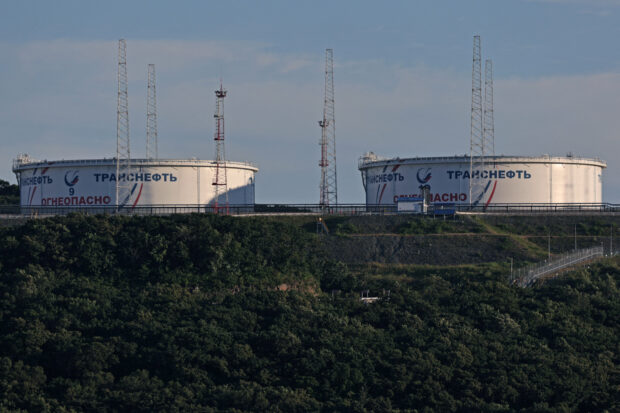
A view shows oil tanks of Transneft oil pipeline operator at the crude oil terminal Kozmino on the shore of Nakhodka Bay near the port city of Nakhodka, Russia Aug 12, 2022. REUTERS/Tatiana Meel
NEW YORK – Oil prices rose about a dollar a barrel on Monday on concerns that tensions in the Middle East and Russia’s ongoing invasion of Ukraine could curb global supplies.
Brent crude futures settled higher by 66 cents, or 0.9 percent, at $77.99 a barrel and U.S. West Texas Intermediate crude futures settled at $72.78 a barrel, up 50 cents, or 0.7 percent. Both contracts gained for the first time in four sessions.
Traders have been closely following the situation in the Middle East, where progress on ceasefire negotiations between Israel and Hamas appeared elusive, indicating tensions in the oil-producing region are set to linger.
READ: Oil edges up as geopolitical concerns support prices
The United States also continued its campaign against Houthis in Yemen, whose attacks on shipping vessels have disrupted global oil trading routes.
In Russia, two Ukrainian drones struck the largest oil refinery in the country’s south on Saturday, a source in Kyiv told Reuters, in the latest in a series of long-range attacks on Russian oil facilities, which has reduced Russia’s exports of naphtha, a petrochemical feedstock.
“These attacks on Russian oil supplies are starting to take a toll,” said John Kilduff, partner at New York-based Again Capital LLC.
Monday’s gains come after oil prices slumped 7 percent in the previous week on concerns about weak economic activity in China and fading hopes of imminent interest rate cuts in the United States.
“There is only so much this market can discount before you have to say that we are not pricing in the geopolitical risk accurately,” Kilduff added.
Limiting oil’s gains, data on Monday showed U.S. services sector growth picked up in January, dampening hopes of rate cuts even more and pushing the U.S. dollar to its highest in almost three months against other major currencies.
READ: Oil ticks up as markets weigh Middle East tensions, supply forecasts
A stronger greenback lowers demand for dollar-denominated oil from investors holding other currencies.
Rising oil supplies are also keeping oil prices in check. U.S. crude stockpiles likely rose last week, according to a preliminary Reuters poll.
“(Monday’s) uptick, which has followed last week’s price declines, isn’t quite like risk-driven price jumps of the past,” said Gaurav Sharma, an independent energy analyst based in London.
“Incremental non-OPEC supply, especially that of U.S. light crude, is largely keeping oil markets honest,” Sharma added.

